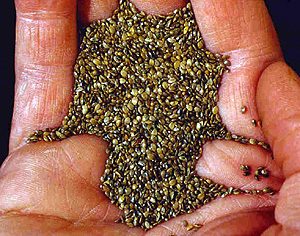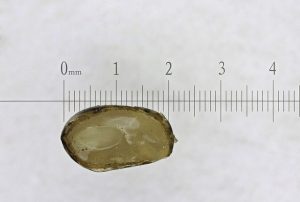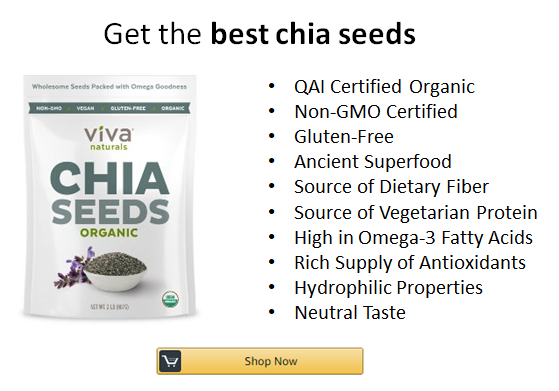Chia seeds already knew Maya and Aztecs as medicinal plants. It originates from Mexico and is cultivated both there and in Guatemala. Chia seeds have been established in the USA since 1980. Modern studies and research results confirm the positive effect of Chia seeds on health.
Contents
 For a long time it was assumed that the Chia seeds can be used to support the treatment of diabetes. This assumption has now been confirmed by several studies. In January 2009, a study was published in the British Journal of Nutrition. It is said that Chia can normalize insulin resistance and at the same time lower blood lipids and cholesterol. This has been successfully tested in rats suffering from diabetes.
For a long time it was assumed that the Chia seeds can be used to support the treatment of diabetes. This assumption has now been confirmed by several studies. In January 2009, a study was published in the British Journal of Nutrition. It is said that Chia can normalize insulin resistance and at the same time lower blood lipids and cholesterol. This has been successfully tested in rats suffering from diabetes.
This also confirmed the results of a 2007 study published in the specialist journal “Diabetes Care” (source: http://www.nsrinews.com/nsriChia_research. html). It has already been found that Chia seeds can lower the risk factors of type 2 diabetes in relation to coronary arteries. Chia seeds become a gel through their ingredients, which slows down the degradation of carbohydrates. Sugar can enter the body gradually and better processed. These are the sensational results of years of research.
In a 2009 study conducted by David C. Nieman (Appalachian State University, North Carolina), adult overweight subjects received 25 grams of dietary supplementation per day for 12 weeks, while another group received only one placebo. It was found that the chia seed group did not decrease significantly compared to the placebo group. The scientists concluded that Chia seeds do not cause weight loss in themselves.
This is a plausible conclusion. Chia seeds are not intended to supplement the daily diet, but to replace some of them. They are relatively low in calories and at the same time rich in nutrients, which is not the case with bread, for example. Slimming with Chia seeds only works if they replace bad eating habits.
Incidentally, coconut oil is also suitable for slimming because its fatty acids are not stored by the body but burned directly.
According to a study in Nutrition Research magazine, which dates back to 2005, chia seeds are the largest suppliers of ALA, alpha-linolenic acid. It is an essential omega-3 fatty acid that reduces the risk of cardiovascular disease, reduces cortisol levels and even prevents cancer.
Furthermore, it has been proven that Chia seeds, like other foods containing these special fatty acids (omega-3, omega-6), improve brain function. Our brain contains these omega-3 and omega-6 fatty acids as important building blocks. As Dr. Wayne Coates explains, chia seeds contain at least a quarter of protein. Chia seeds are therefore also an excellent source of protein for vegetarians and a highly effective source of energy for athletes.
Scientifically investigated nutrient density
 According to NutritionData, 1 ounce of dried Chia seeds (that is 28 g or about 2 tablespoons) contains 18 percent calcium, 27 percent phosphorus, 30 percent magnesium, 30 percent manganese and potassium, zinc and copper. Because this amount of Chia seeds also contains 42 percent dietary fibre, the plant is an excellent help for constipation. Chia seeds also contain antioxidants known to bind free radicals, which minimizes the risk of cancer. The calcium content has a positive effect on the bone structure.
According to NutritionData, 1 ounce of dried Chia seeds (that is 28 g or about 2 tablespoons) contains 18 percent calcium, 27 percent phosphorus, 30 percent magnesium, 30 percent manganese and potassium, zinc and copper. Because this amount of Chia seeds also contains 42 percent dietary fibre, the plant is an excellent help for constipation. Chia seeds also contain antioxidants known to bind free radicals, which minimizes the risk of cancer. The calcium content has a positive effect on the bone structure.
Antioxidants can also be used to slow down the aging process and neutralize free radicals. In the seed itself, these substances protect the seed from becoming rancid due to its sensitive fats. Other valuable ingredients are the vitamins B1 (thiamine), B2 and B3 (niacin).
The nutrients in Chia seeds have very little calories. The plant fibres and the high protein content cause the seeds to swell when they are ingested with food. It’ll make you feel full faster and less hungry. The medicinal plant is therefore an ideal support for weight loss. Proteins help control appetite and cravings.
Integration of Chia seeds into the daily diet
Chia seeds can be eaten raw, soaked in juice or added to porridge and pudding. Chia seeds are also used in baked goods. If you like, you can also sprinkle them on rice dishes, muesli or yoghurt or add vegetables. They are ideal as sauce binders and egg substitutes for vegans because of their ability to absorb water and fat and turn them into gel. The recommended dosage is 20 grams, which is approximately 1.5 tablespoons of Chia seeds. Chia seeds do not have any significant side effects. Here are some recipes.



